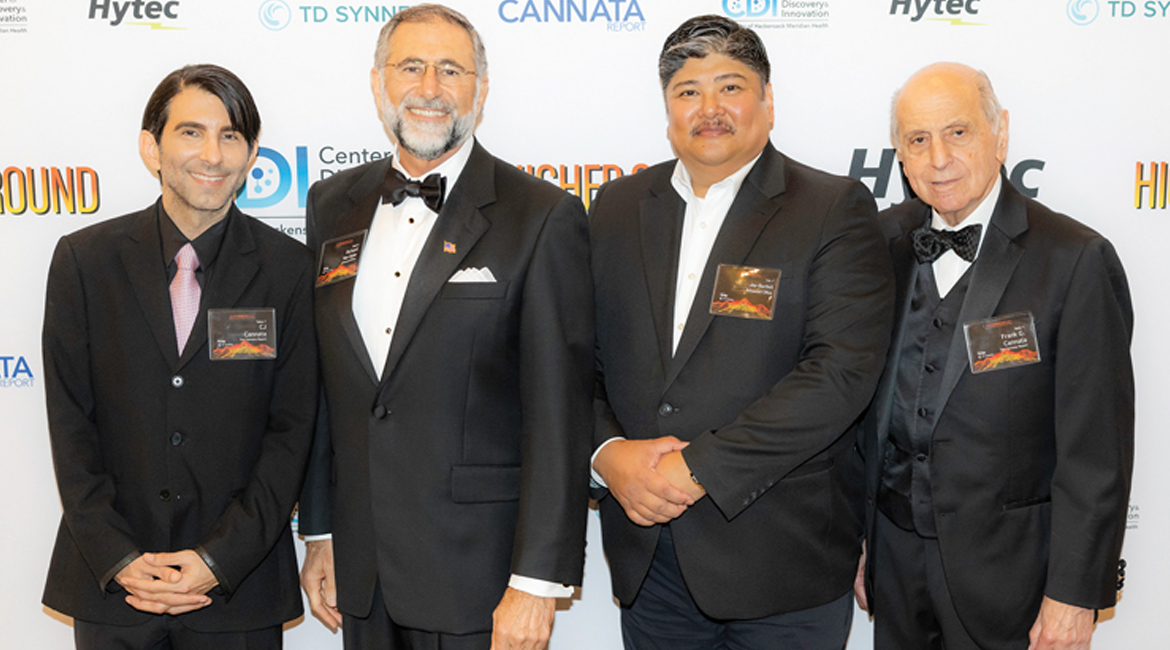
In our ongoing effort to honor the sacrifices of U.S. veterans, we seek to share their experiences—especially those who find it difficult to talk about their service. Fortunately, Jay Bartlett, of Advanced Office in Irvine, California, was willing to open up about his time in the military. (Jay is pictured with CJ, Richard Van Dyke and me.)
Bartlett enlisted in the U.S. Air Force in 1995, following in his brother’s footsteps. He began as a law enforcement specialist at Vandenberg Air Force Base in Santa Barbara County, California, before joining the elite Emergency Service Team, tasked with neutralizing threats to government installations. He deployed to the Middle East for multiple tours during Operation Desert Shield/Storm, including a harrowing assignment in Dhahran, Saudi Arabia. On June 25, 1996, his base was attacked, resulting in 19 deaths and over 260 injuries. Amid the chaos, Bartlett played a critical role in evacuating the wounded and administering lifesaving aid.
A skilled marksman, he earned the Small Arms Expert Marksmanship ribbon with a bronze star and competed on the Defender Challenge USAF Space Command team, demonstrating elite tactical and physical abilities. In this Q&A, Bartlett reflects on the lessons he learned while serving in the military and the challenges of returning to civilian life and finding a position best suited to his skills.
FC: What was your initial reaction to becoming a civilian again?
Bartlett: I was not looking forward to it. My next tour came up, and it was to be Korea. We were not allowed to bring family, so I opted out at that time, which was in 1998.
FC: What is your job description and what are your responsibilities at Advanced Office? How did you develop or learn the skills required for your job?
Bartlett: I took the G.I. Bill and applied for a computer trade school, which paid for my entire training including certification by Microsoft. It kicked off my entire IT career. Thanks to that training I am the IT director for Advanced Office.
FC: What made you choose IT training over a four-year college degree?
Bartlett: My concern was coming out of a four-year college, deciding what kind of career I wanted, and then going to find it. The only thing I knew anything about was law enforcement. My mother had a lot of influence and did not want me to become a cop. The option of a computer trade school appealed to me.
FC: What advice would you give to a veteran who has just been separated and is seeking employment?
Bartlett: Apply for the G.I. Bill to attend a national trade school, not a four-year college. Trade schools get you a job faster than a four-year college education. A national trade school will teach you a craft with a real skill, and you can embed yourself in that. There are so many things a trade school can prepare you for.
FC: What advice would you give civilians interested in helping veterans find employment?
Bartlett: Determine what they are good at or what their interests are. Tell the veteran to explore what they want to do and narrow it down to what they think is best. There are so many trade schools they can apply to that would fit their interests.
FC: What did the military do for you that helped shape your life and make you a better person?
Bartlett: The importance of being disciplined. You are taught to be the first one in and the last one out, and to be dependable and require very little supervision. Most importantly, the military teaches much about honesty, trust, and loyalty. Most corporations—large or small—highly value these qualities.
FC: Would you like to add anything else to what you’ve already shared?
Bartlett: What did I learn in the military that was most important? I learned how to get along with different personalities with people from different backgrounds, states, and mindsets. We were required to work as a team, which eventually led to the best results.




